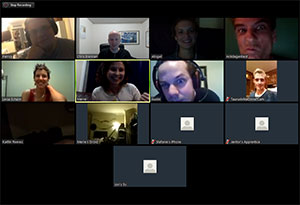 In the 44th episode of the show Leisa Schaim joins me to talk about a few different research projects and topics related to astrology that we’ve been working on or thinking about lately.
In the 44th episode of the show Leisa Schaim joins me to talk about a few different research projects and topics related to astrology that we’ve been working on or thinking about lately.
The four main topics that we discuss are 1) current models for astrological conferences, 2) finding a more appropriate technical term to use to refer to the concept of “detriment,” 3) the legality of astrology, and 4) how astrologers should interact with public figures who criticize astrology.
This was more of an information discussion about some things both of us had been thinking about lately, and the show ended up being about 2 hours long by the time we covered everything. As a result of that I included some notes on what time we started talking about different topics below.
For more information about Leisa please visit her website at LeisaSchaim.com.
Below you will find an outline of some of the different topics that we touched on during the course of the show, followed by links to download or stream the recording.
Outline of the Episode
- Astrological conferences and improving current models (00:01:30 – 00:38:17)
- ISAR conference voting for speaker selection just finished.
- They are trying a new model, which has some pros and cons.
- Generational differences in terms of astrologers getting paid for speaking at conferences.
- The need to improve on the current models.
- The search for an alternate term for detriment (00:38:17 – 01:03:50)
- Detriment wasn’t talked about a lot in the early tradition.
- Only traces in the early Hellenistic tradition.
- By the time they start talking about it they don’t really seem to have a name for it
- Rhetorius says enantioma, which means “anything opposite or opposed, obstacle, hindrance”. Schmidt translates as contrary or contrariety.
- Schmidt later called it anti-domicile.
- I had been playing with the idea of calling it the sign of a planet’s “antithesis.”
- Recently noticed some people using the term “exile.”
- Starting a community discussion about what to use.
- The legality of astrology (01:03:50 – 01:27:25)
- Leisa was researching this for an OPA article.
- There were challenges to the legality of astrology in the early 20th century.
- Then again in the 1980s.
- Since the 1980s most cases have been decided based on first amendment – freedom of speech.
- Some anti-fortune telling ordinances target only those claiming to alter someone’s fortune. Potentially problematic for those who do remediation?
- Interacting with public figures who criticize astrology (01:27:25 – 01:43:30)
- Sometimes certain types of astrologers try to pick fights with public figures.
- This is problematic for a number of reasons.
- Often not great motivations underlying it.
- Detrimental to the astrological community.
Other News: Free Webinar on September 13
- Chris is going to start offering a monthly webinar for people who support the podcast through Patreon at the 5 and 10 dollar tiers.
 Will be like a video chat session or hangout where we discuss some of the topics covered in the podcast that month.
Will be like a video chat session or hangout where we discuss some of the topics covered in the podcast that month.- Will be more interactive than the podcast, since participants will have the opportunity to ask questions.
- See the screenshot to the right for an example from a test chat session we did recently.
- Going to do a free preview webinar that is open for anyone to join in order to demo what it is about on September 13 at 1:00 PM Mountain Time.
- Spaces are limited, so first come first served.
- Patreon subscribers get first dibs (you can still signup now to get preference).
- Click here for more information about the webinar
Transcript
A full transcript of this episode is available: Episode 44 transcript
Listen to This Episode
You can either play this episode of the podcast directly from the website or download it as an MP3 to your computer by using the buttons below:
Podcast: Play in new window | Download (Duration: 1:49:12 — 50.2MB)
